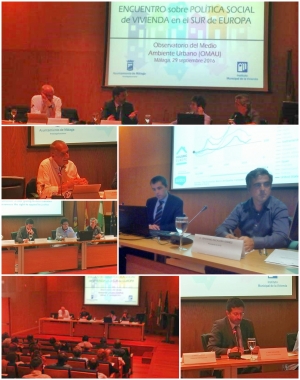Social housing in Mediterranean Europe
Housing Europe members share challenges and ideas with each other
Malaga, 30 September 2016 | Published in Economy, Social
In an increasingly two-tier Europe there are different groups of EU member states that face similar challenges, a reality that leads to initiatives that bring them together to find the best possible ways to address them. Following the example of their political leaders who held recently in Athens the first Med Summit, Housing Europe member from the Mediterranean were hosted on September 29th in Malaga to discuss the next steps for the public, cooperative and social housing sector that has been hit hard by the crisis.
Marco Corradi, President of ACER Reggio Emilio, representing FEDERCASA in Italy, Joao Carvalhosa of CECODHAS Portugal, Sebastien Garnier of the Federation of Dutch Housing Associations (Aedes) representing Housing Europe and Evi Kaila from the Greek Ministry of Labour and Social Security, who used to work for the former Greek member of Housing Europe, OEK that was closed down due to austerity measures met in Malaga on the initiative of Jeronimo Escalera Gomez, President of AVS, the Spanish public housing body.
Evi Kaila said that before the crisis in Greece there was a very high ownership share and a strong construction sector with no particular state intervention. The governments from 2000 onwards, however, fostered strongly mortgage loans. OEK provided access to social home ownership through loan subsidies or interest reduction, financed by employees. According to Evi the crisis led to a drop of home ownership from 84% to 75%, while construction practically stopped.
Since the abolishment of the OEK there is no safety net for those need apart from a regulation that gives the right to over-indebted households to take legal action regarding their mortgages and the law to fight the humanitarian crisis that includes among other measures rent subsidies especially for single parent families, long-term unemployed and people with zero income. Concluding Evi highlighted that the ministry aims to set up a new social housing body that will manage the stock of public housing that remains vacant and that will combine rehabilitation of housing units with access to jobs. The programme will be funded jointly by the national budget, municipalities and regions, the EIB and other EU funding sources.
Marco Corradi stressed that due to the crisis the cost of construction, energy and maintenance increased while the income dropped. This affected the biggest part of the Italian population, including the middle class. Now, costs for mortgage, rent and energy bills are high for many people, particularly because of the fact that the stock is really old. At the same time, it is estimated that there 20.000 public and more than 5 million private empty flats! Towards this direction a Fund of 500 million Euros has been established to rehabilitate empty and old flats.
The key challenge for the country, according to Marco, is to lower the overall housing costs. As far as the social housing sector is concerned the rent is really low in one significant part of the stock (down to 100 Euros/month) which makes it difficult for landlords (Federcasa members) to manage. On the other side a share of the flats is dedicated to people with no income or at risk of social exclusion. Closing his intervention Marco highlighted that it is important to have a dedicated funding stream for social housing, especially in times of crisis. Maybe the Fondo de depositi could be an option along the line of the French model…
Joao Carvalhosa underlined from the beginning the fact that there are many- more than 700.000- dwellings empty and in need of refurbishment, while the owners do not currently have enough means to maintain their homes. The legislative framework changed in 2014, removing a layer of protection from tenants regarding their rent, that is now assessed based on their income on a regular basis.
Read MoreJoao identified that the construction sector is picking up slowly again, but he said that paradoxically the requirements for building are still rather strict, including the conditions for energy efficient refurbishments. Housing policies in Portugal are designed at local level and the government owns around 14.000 public dwellings that shape one type of landlord with the other being cooperative and social housing bodies. However, most cooperatives went out of the game, mainly because investments in projects drove them bankrupt.
Jeronimo Escalera Gomez highlighted that the key general problem is the lack of financing, especially for new projects that are urgently needed, since the traditional social housing model does not offer enough rent options for population groups that increasingly fail to pay back their mortgages. Therefore, AVS urges the government to make finance available through banks that is also required for renovation. The European Investment Bank (EIB) option is a real challenge for the sector because of the rather high minimum amounts.
AVS is coordinating with the banking sector to prevent evictions and to regulate, thanks to a new law, insolvencies of individuals. At the same time energy poverty is a crucial issue at a moment when the Spanish energy market shows monopolistic signs. The standards set by the EPBD are a real challenge for public housing that is increasingly under economic pressure. AVS members are not allowed to make losses, otherwise they have to close. There is a political push from central government to liberalize the public sector in the fear of the effect on public debt at local level.
Sebastien Garnier brought the European dimension to the meeting, representing Housing Europe. Sebastien presented an overview of the various financing models of the social housing sector across the continent while he also briefly identified the different funding tools available at EU level.